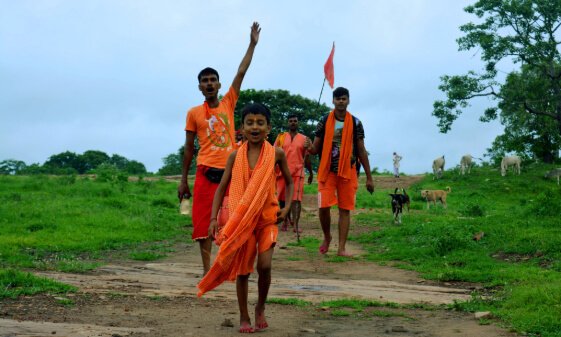Kanwariya Violence and the Rise of ‘Para Sovereignty’ in Public Life
Man Attacked and Bike Smashed by Religious Pilgrims in Uttar Pradesh
July 11, 2025
(Representative) photo by Snipershanu, licensed under Creative Commons
A group of Kanwariyas, religious pilgrims, beat up a man and smashed his motorcycle over a minor collision in Uttar Pradesh on July 10, while the police merely “pacified” the crowd and escorted the victim to safety. This is not an isolated incident, and there is a name for what such actions, now increasingly common, represent: para sovereignty. It refers to situations where groups outside the state act as if they have the authority to enforce rules, punish others and dominate public space – powers that belong solely to the state.
The incident took place when a man on a motorcycle brushed past a Kanwar. After that moment of unintended contact, he was attacked. The Kanwariyas not only beat him but also damaged his vehicle, according to PTI, which reported that police intervened, but their role was limited to reacting. They “pacified” the Kanwariyas, as if the crowd was simply emotionally upset rather than breaking the law.
As we know, a Kanwar is a symbolic vessel carried by Kanwariyas, devotees of Lord Shiva who take part in an annual pilgrimage across North India during the Hindu month of Shravan. However, the violence in this case had nothing to do with the religious identity of the victim. It appears to have stemmed from a sense of entitlement over public property and spaces among the Kanwariyas. Every year, during the Kanwar Yatra, roads are taken over, traffic blocked, public property vandalised, and at times, people assaulted, as seen again in this latest incident.
Law enforcement agencies are often seen managing the event around the Kanwariyas rather than regulating them. It is as if the rules of civil behaviour and the relevant laws are suspended during this period, and the group temporarily acquires a sense of social and legal impunity. This phenomenon can be seen in several religious processions or gatherings during festivals across different religions.
In political science, the state is defined, among other things, by its monopoly over the legitimate use of force. This means that only state institutions, like the police and judiciary, have the authority to use or authorise violence. When non-state actors begin to act as judge, jury and enforcer, they encroach on the state’s core function. They act like a parallel authority, usually tolerated by the state either out of fear, political calculation or apathy. That’s para-sovereignty.
No religious procession, regardless of the group’s religious affiliation, should be allowed to operate with mob behaviour and without fear of the law. The religious character of a procession or ritual is not an excuse under any law. Walking in devotion is one thing, but that changes when devotion is turned into a show of dominance. A large group moving through towns demanding space, obedience and sometimes silence from bystanders is asserting power, not expressing faith.
The man who was attacked in this case didn’t harm anyone. It was a “minor collision,” not even intentional. The incident shows a cultivated sense of impunity, a belief that their collective identity gives them exemption from social and legal consequence. This belief only grows when the state consistently backs off, downplays, or manages such incidents instead of prosecuting them.
When police officers intervene only to calm crowds, law enforcement becomes law accommodation. Religion can exist in the public sphere, but the rules of citizenship must remain equal for everyone.
In this case, the police reportedly made no arrests. They apparently did not even issue warnings that violence is unacceptable under any circumstances. Instead, they relied on the language of de-escalation rather than justice. As a result, the victim’s safety became a matter of luck, not of rights. There is no way to know how many others will be that “fortunate” in the future.
In addressing the issue of para sovereignty, Kanwariyas cannot be singled out. Whether it is cow vigilantes, mobs engaged in moral policing, or groups that attack minorities, each instance sets a precedent that the law will bend or quietly step aside.
Para-sovereignty often begins with “exceptions.” A festival here, a march there, a road closed for a few days. Then it becomes normal. Then it becomes political capital. Then it becomes a threat, subtle or explicit, against anyone who disagrees. And this affects all, not only minorities, the poor or the marginalised.
The victim of this incident might repair his bike and go home. But the real damage is elsewhere. The next time someone sees a group of Kanwariyas approaching, they will step aside, not out of respect, but out of fear. The true price of tolerating para sovereignty is that everyday citizens are forced to assume that some people are above the law, and they must fall in line, with no real alternative but to submit.
Democracy is a shared system of rules, not a daily show of power where the loudest or most violent decide what happens in public spaces.
You have just read a News Briefing by Newsreel Asia, written to cut through the noise and present a single story for the day that matters to you. Certain briefings, based on media reports, seek to keep readers informed about events across India, others offer a perspective rooted in humanitarian concerns and some provide our own exclusive reporting. We encourage you to read the News Briefing each day. Our objective is to help you become not just an informed citizen, but an engaged and responsible one.

